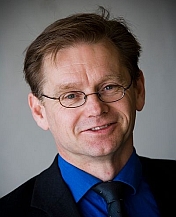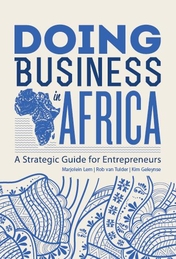A broader scope of influence
By Lesa Sawahata
The SCOPE Centre of Expertise for International Business and Sustainable Development leads the way in research into the internationalisation strategies of the world’s largest and most ‘global’ companies, and has a strong focus on ESG – environmental, social and (corporate) governance issues that are concurrent with multinational business development.

SCOPE Scientific Director and ERIM Fellow <link people rob-van-tulder>Professor Rob van Tulder was the founder of the centre, which was established in 1995. At that time he was a member of RSM’s Department of Strategy, and together with other faculty members organised in the first really multi-departmental research group, had been engaged in large research projects examining the burgeoning world of international business.
“We were facing the first breakthroughs in a process called ‘globalisation’,” he says. Contextually, foreign direct investment had been accelerating since the 1980s, overtaking even the growth of national economies and trade (normally used as an indication of globalisation) since the 1990s. The growth of the multinational firm not only signalled a fundamental change in the world economy; “by the 90s,” says Prof. van Tulder, “we recognised that the maturing multinational enterprise has importance to society, and was impacting the health and ecology and social structures of the world.”
Only through research focused on the internationalisation strategies of socalled ‘core companies’ – the largest and most global in the world – over time, could corresponding changes in the international economic and societal environment be understood, reasoned Prof. van Tulder and his co-researchers. Thus SCOPE and its flagship project, the SCOPE database, were born.
Top 100 data
The SCOPE database is now a mature source of collected data that documents the international presence of the world’s ‘core’ companies (which include for instance oil & gas, automotive, and electronics companies familiar to every consumer) since 1990. The database currently includes over 9,000 entries covering more than 500 companies, including annual figures on assets, sales and employees and how this information is broken down by geographic area.
The SCOPE database is distinguished by the quality of its data; young researchers working within the centre painstakingly compiled this information on the basis of annual reports. Surveys don’t work, argues Professor Van Tulder. “Even the CEO of a company doesn’t know the exact data,” he says, “so there is this laborious and very intense process of compiling primary data exclusively from annual reports for a large sample of firms."
A minimum of 400 firms are examined each year; this large sampling, and rigorous research methodologies ensuring the most accurate possible data, helped to facilitate SCOPE’s long-term collaboration with the United Nations Conference on Trade Aid and Development (UNCTAD). Every year since 1995, SCOPE data has provided the substance for the list The world’s top 100 Trans National Companies (TNCs) ranked by foreign assets, part of UNCTAD’s annual World Investment Report. This annual list is widely referenced in the international media each year.
SCOPE’s family tree
Before the launch of SCOPE, Professor van Tulder had already worked on collaborative projects with the UN and the European Union on multinational enterprises. The confluence of his relationship with UNCTAD (which resulted in SCOPE and its prestigious Top 100 TNC list), the realisation of ‘globalisation’ as a new and important phenomenon in business, and Professor van Tulder’s own drive to examine the interface between business and society at an international level, were precipitating factors in the formation of the Business-Society Management Department at RSM in 1997. An MSc in Business-Society Management – later rebranded into the present MSc in Global Business and Stakeholder Management (GBSM) – was launched a few years later, and represented a unique offering in the world of international business schools.
“When we launched the B-SM Department we decided that, unlike other departments that focused on functional areas of business, we would focus on that interface between firms and society. In terms of the GBSM programme, SCOPE provided part of the empirical foundation for studying this interface,” he says. In particular, international firms are confronted with the sticky issues that arise at this interface in a way that domestic firms do much less.
Crossing borders to do business – even between such apparently similar countries as the Netherlands and Belgium - triggers issues around considerable regulatory, structural and cultural differences. The complexities faced by larger organisations, such as Shell, Deutsche Telekom, Walmart or China Petroleum, provide insights into what Van Tulder calls the “most wicked problems” of our time – problems that, it is hoped, the graduates of the GBSM are prepared to address.
“Looked at from the perspective of the international firm, some issues – like pollution, human rights problems, corruption, poverty – just don’t go away. As an oil company for instance you are seriously contributing to pollution, period. Your business model and its related ‘windfall profits’ can bring out the worst in people and administrators,” he says.
The GBSM programme teaches the leaders of future business to address these issues from the firm’s perspective. “If you’re a big oil company like Shell, for example, the challenge then becomes how to develop a future business model in which you might not pollute at all, or in which you receive a licence to operate from the communities you function in despite your particular industry. This is what we stimulate students to examine,” he says. Participants in the programme write Issue Papers touching on a wide variety of topics that arise at the interface of business and society, ranging from labour rights to water rights, from bribery to obesity to human trafficking. Upon graduation they take their insights out into the world of international business, governance or civil society.

Of the current 650 alumni of the GBSM programme, some have become social entrepreneurs, but others have started a career in government – where their knowledge of internationally operating firms, as well as the corporate perspective of “wicked problems”, is highly appreciated. Other graduates have entered multinational business itself or work for international governmental or NGOs, like the UN or the FAO – multinational organisations in their own rights. Professor van Tulder has found that these graduates “bring an awareness of the fact that if companies don’t work on sustainability, in the longer run they won’t have any business.”
Competitive Advantage Firms in his view should strive for a “sustainable sustainable competitive advantage” or S2 competitive advantage – a more sophisticated strategy than management guru Michael Porter’s famous “sustainable competitive advantage”. While Porter was discussing companies whose strategies would enable them to maintain a robust profit over time vis-à-vis their direct competitors in the same industry, S2 competitive advantage adds the crucial layer of society-as-stakeholder. “This links the long term competition in an industry to the creation of value, products and services that are sustainable in the societal view of the world.”
Even the breadth and depth of SCOPE research is not enough to solve the world’s most wicked problems, as Professor van Tulder has discovered over the past decade of working with international business and with NGOs and governmental agencies. These organisations traditionally have tried to ‘go it alone’ in addressing these complex issues. “At SCOPE, we realised about seven years ago that if these issues could be solved by firms, they would have been solved already. Unfortunately they haven’t been.” Collaboration, through formalised alliances with a variety of NGO, governmental and business ‘actors’ is the only way to effect positive change, he says. So-called cross-sector partnerships create new institutions – new rules of the game – that facilitate more effective venues to address wicked problems - hence the formation of the Partnerships Resource Centre (PrC) four years ago.
The PrC, for which Professor Van Tulder acts as Academic Director, brings together academics, practitioners, students, governmental organisations and NGOs to share knowledge across sectors. Its mission statement: “We create, retrieve and share knowledge on partnerships for sustainable development.”
“The PrC has been supported from the beginning by a number of big corporations, some of the largest NGOs in the world, and a big initial grant from the Dutch Ministry of Foreign Affairs,” says Professor van Tulder. “We actively collaborate with other knowledge institutes, such as the Universities of Maastricht, Wageningen and Amsterdam – next to a large number of organisations in developing countries – but the PrC can be considered a logical extension of SCOPE, while RSM remains the lead partner, the backbone of the PrC.”
Business impact

A notable recent collaboration between ‘actors’ is the seminal book <link publications books detail _self>Doing Business in Africa: A strategic guide for entrepreneurs. It is a joint production of the Partnerships Resource Centre, the Netherlands African Business Council, and management consultancy Berenschot. Professor van Tulder, together with two Berenschot consultants and research support from PrC associates, provided the first ever systematic management book on Dutch entrepreneurship in Africa. It received an official launch in January 2013. The book argues in favour of socalled ‘inclusive business’ strategies that Dutch firms should adopt in order to reap a S2 competitive advantage in Africa.
Just three months earlier, the Dutch-language book Duurzaam ondernemen waarmaken (Sustainable Entrepreneurship in Actual Practice), authored by Professor van Tulder and Andrea da Rosa of the PrC together with two consultants from Royal Haskoning DHV was released. Commissioned by the Management Studies Foundation, one of the first copies was presented to Bernard Wientjes, Chairman of the Confederation of Netherlands Industry and Employers (VNO-NCW) on 28 September 2012. The book, which will be translated into English this year, has already been nominated for Management Book of the Year 2013.
“Both books have already had an impact on firms,” says Professor van Tulder. Doing Business in Africa has received endorsements from top executives at such international companies as Unilever and Philips, as well as from the new Minister of International Trade and Development Cooperation, the chairmen of VNO-NCW and Partos, the branch organisation of Dutch development NGOs. Both books have received recognition not only for their practical applications but – surprising for an academic publication – for reading enjoyment. These books thus fulfil the ambition of RSM to actively engage in valorisation of the faculty’s research. The African book will likely be followed up by a similar offering on doing business in Latin America and Asia.
This fits into Professor van Tulder’s new initiative, which he calls ‘sustainable diplomacy’. “I am speaking with foreign ambassadors from the Netherlands, because they bring new challenges for our diplomats around the world. The point is that they need to be able to get firms, NGOs and governments together in new coalitions in order to create the preconditions for reaping S2 competitive advantage,” he says. This can be considered a continuation of the typical Dutch model on a global scale, but “without the bureaucracy and the relative ‘decision sclerosis’ that is hampering local decision making at the moment” argues Van Tulder.
Looking to the future
The momentum achieved by SCOPE through its various projects, partnerships and programmes will accelerate in 2013 and beyond. New papers, new publications, and – as every year - a new 100 Top TNC list will be published. October 2013 will mark the 6th Annual Max Havelaar Lecture, as well as the 25th anniversary of the Max Havelaar Foundation, which has been the first label aimed at fair trade and poverty alleviation; this prestigious annual event is a co-operation between the Foundation, the RSM Business-Society Management Department, ERIM, and the PrC. It forms a platform for the latest scholarly insights in the field.
Significantly, a new Chair in International Business and Human Rights sponsored in part by Amnesty International, will also be inaugurated this year; the idea is to “bring international business and human rights organisations together to develop new business models for conflict-ridden regions around the world,” says Professor van Tulder.

<link people rob-van-tulder>Professor Rob van Tulder has published, lectured, and consulted extensively on the topics of European business, multinationals, high-tech industries, corporate social responsibility, issues management, skills, network strategies, smaller industrial countries (welfare states) and European Community/Union policies.
- Visit SCOPE
- Visit the Partnerships Resource Centre
This article is adapted from RSM Insight 13.


